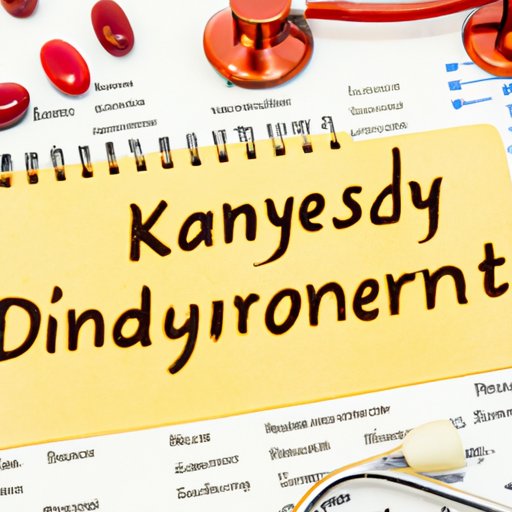Introduction
Renal disease refers to any damage or disease of the kidneys that affects their ability to function correctly. The kidneys are vital organs that play a critical role in filtering toxins, waste, and excess fluids from the blood. They also help balance electrolytes, regulate blood pressure, and produce hormones that control red blood cell production and bone health. Renal disease can impair kidney function, leading to a buildup of waste and fluid, electrolyte imbalances, and other complications. It is essential to understand renal disease to prevent and manage the condition effectively.
Comprehensive Overview of Renal Disease
The kidneys are two bean-shaped organs about the size of a fist located in the lower back. They receive about 20% of the body’s blood supply and filter nearly 120-150 quarts of blood every day. The kidneys produce urine, which carries waste and excess fluids out of the body.
There are many causes of renal disease, including diabetes, high blood pressure, infections, autoimmune disorders, overuse of medications, and genetic factors. People at risk of developing renal disease include those with a family history of kidney disease, older adults, overweight or obese individuals, and those with a history of smoking or drug abuse.
There are several types of renal disease, including acute kidney injury, chronic kidney disease, glomerulonephritis, nephrotic syndrome, renal artery stenosis, and renal failure. Symptoms of renal disease may not appear until significant damage has occurred, but some common signs include fatigue, nausea, vomiting, swelling in the legs and ankles, changes in urination, and high blood pressure. Proper diagnosis and treatment are critical for managing renal disease and preventing further damage to the kidneys.
Diagnosis of renal disease may involve physical exams, blood and urine tests, imaging tests, and kidney biopsies. Treatment options for renal disease vary depending on the underlying cause, the stage and severity of the disease, and the patient’s overall health. Treatment may include medication, lifestyle changes, dialysis, or kidney transplantation.
The Impact of Renal Disease on a Patient’s Physical and Emotional Health
Renal disease can have significant physical and emotional implications on a patient’s life. Physical complications of renal disease include high blood pressure, anemia, bone disease, heart disease, and kidney failure. Patients with renal disease may also experience depression, anxiety, social isolation, and reduced quality of life. Practical tips for managing the disease may include medication adherence, regular follow-ups with healthcare providers, dietary changes, exercise, and stress management.
A Deep-Dive into the Science of Renal Disease
The pathophysiology of renal disease involves damage to the kidneys’ various structures and functions, including blood vessels, tubules, and filtering units. Genetic factors and environmental exposures may also play critical roles in the development and progression of renal disease. Renal function tests and laboratory values can provide crucial information about the status and severity of renal disease, including blood urea nitrogen, creatinine, and glomerular filtration rate.
The Latest Research on Renal Disease
Ongoing research on renal disease aims to develop better treatment options, improve patient outcomes, and prevent further kidney damage. Innovative therapies for renal disease include stem cell therapy, gene therapy, and new pharmacological agents. Clinical trials and experimental treatments are also underway to study the potential benefits of these new treatments. Some exciting areas of research include the development of artificial kidneys, wearable dialysis machines, and novel immunotherapies. Future research directions may focus on using big data and precision medicine to predict and manage renal disease better.
Personal Stories of Renal Disease
Living with renal disease can be challenging, but patients and caregivers can learn to manage the condition effectively. Personal stories of those affected by renal disease can provide valuable insights into the patient’s experience, including coping strategies, emotional challenges, and practical tips. Patient interviews and caregiver perspectives can highlight the need for education, support, and advocacy for renal disease patients and their families.
A Guide for Loved Ones of Renal Disease Patients
Loved ones of renal disease patients play an essential role in providing emotional and practical support for their loved ones. Ways to provide emotional support include active listening, encouraging activities of interest, and providing a safe and supportive environment. Strategies for practical assistance may include assistance with medication management, transportation, and meal planning. Education on the disease and its implications can help loved ones understand how to manage the disease and prevent complications.
Economic Cost of Renal Disease
Renal disease imposes a significant financial burden on healthcare systems and patients. Costs of treatment and management, such as dialysis and kidney transplantation, can be exorbitant, and many patients struggle to afford necessary care. However, there are ways to reduce costs and improve access to care, including increasing funding for research, preventative care, and innovative treatments.
Conclusion
Renal disease is a significant health concern that affects millions of people worldwide. It is essential to understand the causes, symptoms, and treatment options for the disease to prevent and manage it effectively. Proper diagnosis, treatment, and support can help patients and their loved ones cope with the physical, emotional, and financial challenges of renal disease. Ongoing research on renal disease aims to improve patient outcomes, reduce costs, and prevent further kidney damage. With education, support, and advocacy, patients and their families can learn to live with and manage renal disease successfully.
